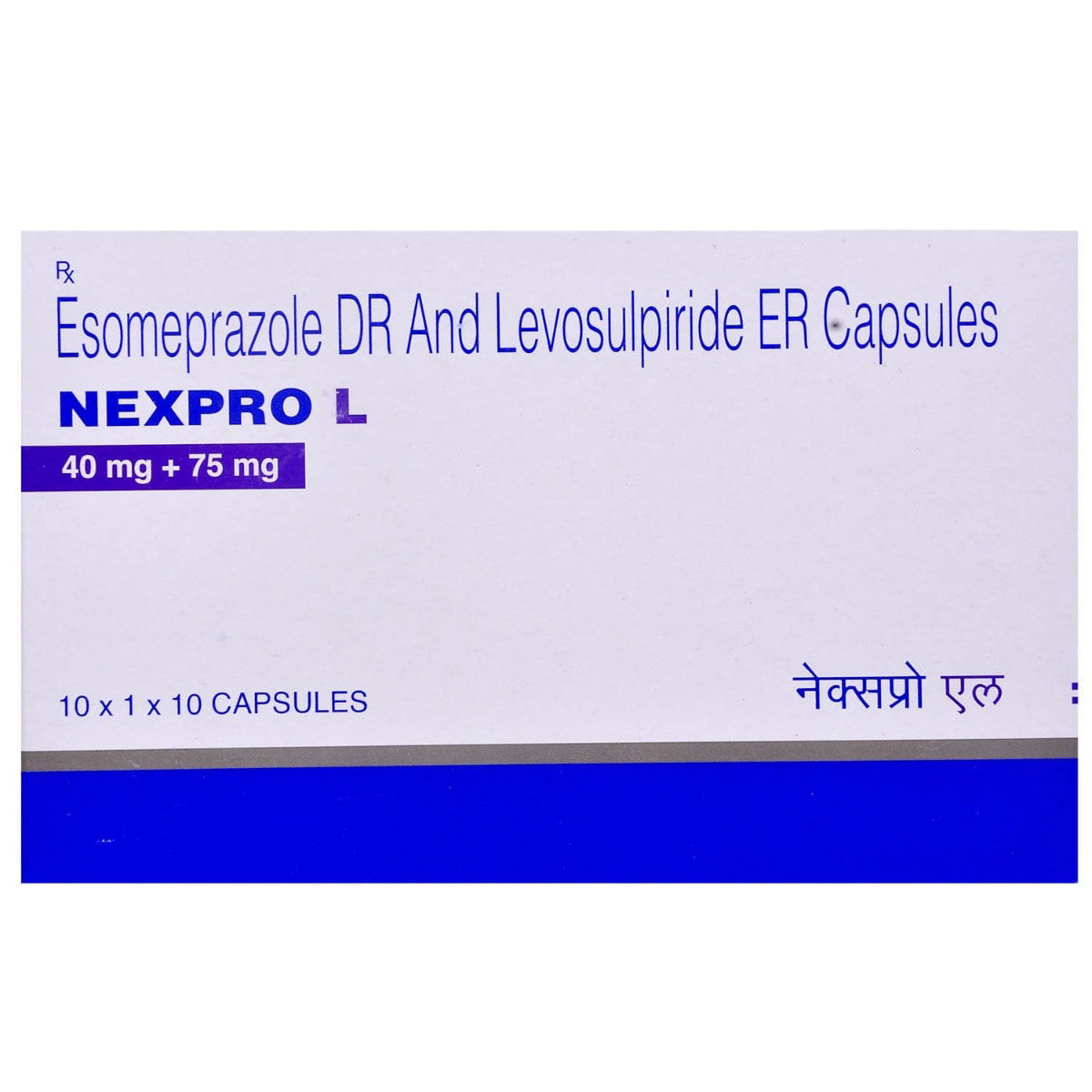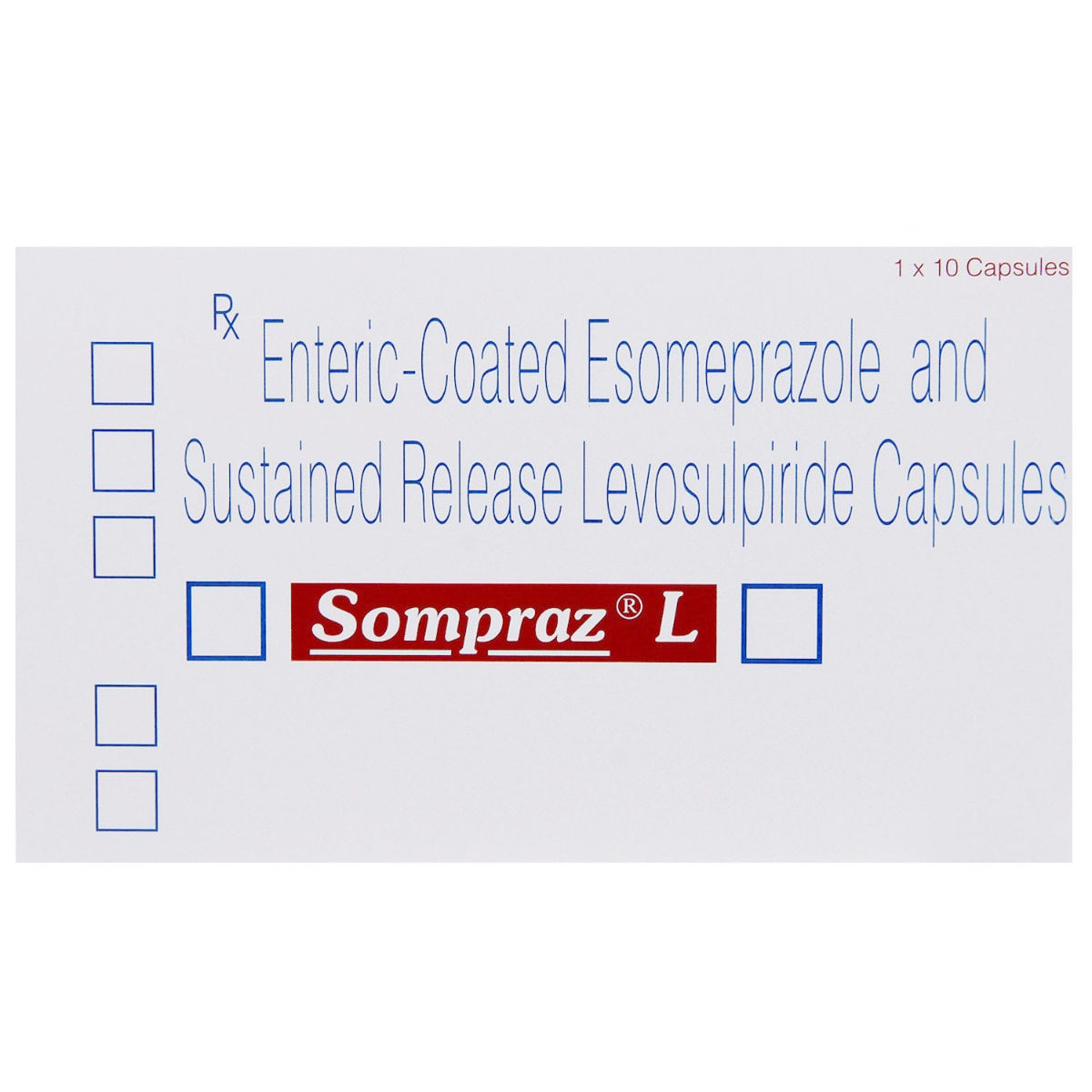Esomeprazole+levosulpiride
About Esomeprazole+levosulpiride
Esomeprazole+levosulpiride belongs to a group of medicines called gastrointestinal agents used to treat gastro-oesophageal reflux disease (GERD). Gastroesophageal reflux disease occurs when stomach acid frequently flows back into the food pipe (oesophagus); this causes acidity, pain and heartburn. Symptoms include heartburn, sour or bitter taste in the mouth and difficulty swallowing.
Esomeprazole+levosulpiride contains Esomeprazole and Levosulpiride. Esomeprazole works by blocking the action of an enzyme called gastric proton pump, which is responsible for the production of acid. Levosulpiride works by increasing the stomach and intestinal movement and pressure of the inferior oesophageal (food pipe) sphincter, thereby preventing the backflow of food and acid into the mouth. Together, Esomeprazole+levosulpiride helps in preventing acid reflux, thereby providing relief from acidity and heartburn.
You are advised to take Esomeprazole+levosulpiride for as long as your doctor has prescribed it for you, depending on your medical condition. In some cases, you may experience certain common side effects such as headache, abdominal pain, constipation, diarrhoea, flatulence, nausea and vomiting. Most of these side effects do not require medical attention and will resolve gradually over time. However, you are advised to talk to your doctor if you experience these side effects persistently.
Inform your doctor before taking Esomeprazole+levosulpiride if you have a history of gastrointestinal bleeding or intestinal obstruction. On long-term treatment, Esomeprazole+levosulpiride may increase the risk of bone fractures. Consult your doctor if you are pregnant or breastfeeding. Esomeprazole+levosulpiride may cause drowsiness and dizziness, so drive only if you are alert. Esomeprazole+levosulpiride should not be given to children as safety has not been established. Avoid consuming alcohol along with Esomeprazole+levosulpiride as it could lead to increased drowsiness and can elevate the production of stomach acid.
Uses of Esomeprazole+levosulpiride
Medicinal Benefits
Esomeprazole+levosulpiride belongs to a group of medicines called gastrointestinal agents used to treat gastro-oesophageal reflux disease (GERD). Esomeprazole+levosulpiride is a combination of two drugs, namely: Esomeprazole (proton pump inhibitor) and Levosulpiride (prokinetic agent). Esomeprazole works by blocking the action of an enzyme called gastric proton pump, which is responsible for the production of acid. Levosulpiride works by increasing the stomach and intestinal movement and pressure of the inferior oesophageal (food pipe) sphincter, thereby preventing the backflow of food and acid into the mouth. Together, Esomeprazole+levosulpiride helps in preventing acid reflux, thereby providing relief from acidity and heartburn.
Directions for Use
Storage
Side Effects of Esomeprazole+levosulpiride
- Headache
- Abdominal pain
- Flushing
- Dry mouth
- Constipation
- Diarrhoea
- Flatulence
- Nausea
- Vomiting
Drug Warnings
Do not take Esomeprazole+levosulpiride if you are allergic to any of its contents, if you are taking nelfinavir (anti-HIV), if you have a gastrointestinal haemorrhage, mechanical obstruction or perforation, epilepsy, mania, porphyria, or cardiac impairment. Inform your doctor before taking Esomeprazole+levosulpiride if you have severe liver or kidney problems; if you are due to have Chromogranin A test; if you experience unexplained weight loss, stomach pain, indigestion, vomit food or blood, or if you pass black stools. On long-term treatment, Esomeprazole+levosulpiride may increase the risk of bone fractures. Do not take Esomeprazole+levosulpiride if you are pregnant or breastfeeding. Esomeprazole+levosulpiride may cause dizziness and drowsiness, so drive only if you are alert. Esomeprazole+levosulpiride should not be given to children as safety has not been established. Avoid consuming alcohol along with Esomeprazole+levosulpiride as it could lead to increased drowsiness and can elevate the production of stomach acid.
Drug Interactions
Drug-Drug Interactions: Esomeprazole+levosulpiride may interact with painkillers (aspirin, naproxen), anti-HIV (atazanavir), blood thinner (clopidogrel, warfarin, cilostazol), anti-fungal (ketoconazole, itraconazole, voriconazole), anti-cancer (erlotinib, methotrexate), anti-depressant (citalopram, imipramine, clomipramine, duloxetine), anti-anxiety (diazepam), anti-convulsant (phenytoin), gastroprokinetic agent (cisapride), a drug used to treat heart problems (digoxin), immunosuppressant (tacrolimus), anti-tuberculosis (rifampicin).
Drug-Food Interactions: No interactions found/established.
Drug-Disease Interaction: Inform your doctor if you have epilepsy, mania, Clostridium difficile-associated diarrhoea (CDAD), liver disease, bone fractures, or hypomagnesemia (low levels of magnesium).
Drug-Drug Interactions Checker List:
Safety Advice

Alcohol
unsafeAvoid consumption of alcohol while taking Esomeprazole+levosulpiride. Alcohol intake leads to increased production of stomach acid, thereby increases acidity and heartburn.

Pregnancy
unsafeEsomeprazole+levosulpiride should not be taken if you are pregnant. Consult your doctor before taking Esomeprazole+levosulpiride if you are pregnant.

Breast Feeding
unsafeEsomeprazole+levosulpiride may pass into breast milk. Consult your doctor before taking Esomeprazole+levosulpiride if you are breastfeeding.

Driving
cautionEsomeprazole+levosulpiride may cause dizziness, drowsiness and blurred vision. Do not drive or operate machinery unless you are alert.

Liver
unsafeEsomeprazole+levosulpiride should not be used in patients with hepatic impairment. Consult your doctor before taking Esomeprazole+levosulpiride if you have a liver impairment or any concerns regarding this.

Kidney
cautionDose adjustment may be needed. Consult your doctor before taking Esomeprazole+levosulpiride if you have kidney impairment or any concerns regarding this.

Children
unsafeEsomeprazole+levosulpiride should not be given to children as the safety and effectiveness were not established.
Habit Forming
Diet & Lifestyle Advise
Eat smaller meals more often.
Avoid smoking and alcohol consumption. Alcohol intake leads to increased production of stomach acid, thereby increasing acidity and heartburn.
Maintain a healthy weight by regular exercising.
Avoid lying down after eating as it causes acid reflux.
Avoid tight-fitting clothes as it might increase the pressure on the abdomen leading to acid reflux.
Practise relaxation techniques and avoid stress by doing yoga or meditation.
Avoid foods such as high-fat food, spicy food, chocolates, citrus fruits, pineapple, tomato, onion, garlic, tea and soda.
Avoid sitting continuously as it may trigger acidity. Take a break of 5 minutes every hour by doing brisk walking or stretching.
Special Advise
Esomeprazole+levosulpiride may cause changes in blood tests for checking liver functioning. Inform the person doing the tests that you are taking Esomeprazole+levosulpiride.
Inform your doctor before taking Esomeprazole+levosulpiride if you are due to have Chromogranin A test.
Patients Concern
Disease/Condition Glossary
Gastroesophageal reflux disease (GERD): The stomach is usually protected from acid by a mucous layer. In some cases, due to excess acid production, the mucous layer gets eroded, which leads to complications like GERD, acidity, heartburn and peptic ulcers. Gastroesophageal reflux disease (GERD) occurs when stomach acid frequently flows back into the food pipe (oesophagus). This backflow (acid reflux) irritates the food pipe and causes heartburn and acidity. Symptoms include heartburn, sour or bitter taste in the mouth and difficulty swallowing.
FAQs
Esomeprazole+levosulpiride is used to treat gastro-oesophageal reflux disease (GERD). Gastroesophageal reflux disease occurs when stomach acid frequently flows back into the food pipe (oesophagus); this causes acidity, pain and heartburn. Symptoms include heartburn, sour or bitter taste in the mouth and difficulty swallowing.
Esomeprazole+levosulpiride is a combination of two drugs, namely: Esomeprazole and Levosulpiride. Esomeprazole works by blocking the action of an enzyme called gastric proton pump, which is responsible for the production of acid. Levosulpiride works by increasing the stomach and intestinal movement and pressure of the inferior oesophageal (food pipe) sphincter, thereby preventing the backflow of food and acid into the mouth. Together, Esomeprazole+levosulpiride helps in preventing acid reflux, thereby providing relief from acidity.
Diarrhoea might be a side-effect of Esomeprazole+levosulpiride. Drink enough fluids and eat non-spicy food if you experience diarrhoea. If you find blood in stools (tarry stools) or if you experience severe diarrhoea, consult your doctor. Do not take anti-diarrheal medicine on your own.
Do not take Esomeprazole+levosulpiride with nelfinavir (a drug used to treat HIV infections). Consult your doctor before taking Esomeprazole+levosulpiride with other medicines to rule out unpleasant side-effects.
Esomeprazole+levosulpiride contains esomeprazole which might increase the risk of fracture in the wrist, hip or spine. This mainly occurs in people taking Esomeprazole+levosulpiride for longer durations. Inform your doctor if you have osteoporosis or if you are taking corticosteroids, your doctor may prescribe calcium and vitamin D supplements.
Esomeprazole+levosulpiride may cause changes in blood tests for checking liver functioning. Inform the person doing the tests that you are taking Esomeprazole+levosulpiride.
Dry mouth could be a side-effect of Esomeprazole+levosulpiride. Limiting caffeine intake, avoiding smoking and mouthwashes containing alcohol, drinking water regularly and chewing sugar-free gum/candy might help in stimulating saliva and thereby prevents drying of the mouth.
Esomeprazole+levosulpiride works by relieving the symptoms such as heartburn, stomach pain, or irritation. It also neutralizes the acid production in the stomach to prevent discomfort.
Esomeprazole+levosulpiride contains Esomeprazole and Levosulpiride.
The usual recommendation is to take it one hour before the meal, preferably in the morning.
Yes, Esomeprazole+levosulpiride may cause dizziness and drowsiness, so drive or operate machinery only if you are alert.
Yes, it can help to ease stomach pain.
Store Esomeprazole+levosulpiride according to the instructions on the leaflet, away from sunlight, at a temperature not exceeding 25°C. Dispose of unused medicine. Keep it out of reach from pets and children.
You'll usually take Esomeprazole+levosulpiride in the morning one hour before the food or as directed by the physician.
Esomeprazole+levosulpiride is contraindicated to use if you are allergic to any of its contents if you are taking nelfinavir (anti-HIV) if you have a gastrointestinal haemorrhage, mechanical obstruction or perforation, epilepsy, mania, porphyria, or cardiac impairment. It is also contraindicated to use in pregnant and breastfeeding women.
Esomeprazole+levosulpiride might increase the risk of wrist, hip or spine fracture. This mainly occurs in people taking Esomeprazole+levosulpiride for longer durations.
Common side effects of Esomeprazole+levosulpiride may include headache, abdominal pain, constipation, diarrhoea, flatulence, nausea and vomiting. Most of these side effects do not require medical attention and will resolve gradually over time. However, you are advised to talk to your doctor if you experience these side effects persistently.
Esomeprazole+levosulpiride should not be given to children as safety and effectiveness were not established.










